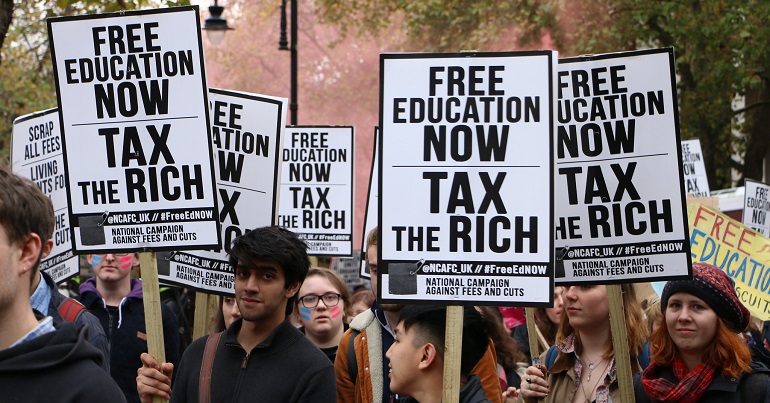Students preparing to bite back
This time last year, I wrote a comment piece for “the Herald”, arguing that today’s students are the most politicised for a generation. The main (though not only) piece of evidence I cited was a massive increase in turnout in student elections up and down the country. Politicians should take note – the conventional wisdom about apathetic youth may be about to be broken.
This week, a year later, three of the early student elections of the season have happened – Edinburgh University, Southampton University and Queens University Belfast. I was keeping a close eye on Edinburgh, where a number of friends were running for sabb positions, including the excellent Young Green Ellie Price, and NUS student journalist of the year, former People & Planeter, and generally very impressive Liz Rawlings. QUB also had Young Green Adam McGibbon running for Vice President, so I had half an eye on that race.
First, last night, Queens University Belfast broke their turnout record (and Young Green Adam was elected with around 1,700 votes).
Southampton then smashed not only their own, but also the British student election turnout record, with more than 7,000 votes cast.
But they didn’t hold the crown for long. Tonight, it’s estimated that more than 7,200 Edinburgh University students voted, adding up to the biggest student election in UK history (as a number of positions are elected, the number of people who participated won’t be confirmed until the morning). For those who care, Young Green Ellie didn’t win, but got what would have been a record number of votes 3 years ago. Liz Rawlings, however, was elected president with an astonishing 3864 votes. To put this in comparison, when I was elected to the job 2 years ago with 2271 first preference votes, this was one of the highest ever figures. I think this means she has more votes than any UK student union sabbatical ever.
OK, so, there are more people at universities these days. 7,000 is on fact not much more than a 25% turnout at Edinburgh. But if students are willing to vote in such large numbers for their union president, then surely more will be willing to vote for the national government. And if candidates are able to organise, on tiny budgets, campaigns which mobilise that many voters, then MPs wanting to hold their seats should start watching, listening, and learning.




Hi Alex,
This is a different piece form the Lib Con one – no reference to Clegg here. I’ll correct the other one.
Adam
“…now Clegg has backed tuition fees”. It’s very naughty to tell lies Adam! The BBC news article you link to is from September – why not have a read of something a bit more recent (December 09) at http://bit.ly/8loWnd. You’ll see that Clegg originally said that the policy of scrapping fees might not be affordable given the state of the economy. This is completely different to saying that he is backing fees, and after doing some detailed costings and research, Clegg has now committed to keeping the Lib Dem policy of scrapping fees.
As for “[politicians] don’t pour big bucks into getting students registered, canvassing halls of residence, or buying mobile phone databases.” That’s just wrong. I would be happy to share with you e-mails exchanged between my colleagues, Bristol University and Unite, who provide accommodation for 39,000 students around the country, about ensuring students are registered to vote. And I would dare you to don a rosette for ANY political party, try and canvass a hall of residence, and see how long it is before the porters/security try and kick you out…